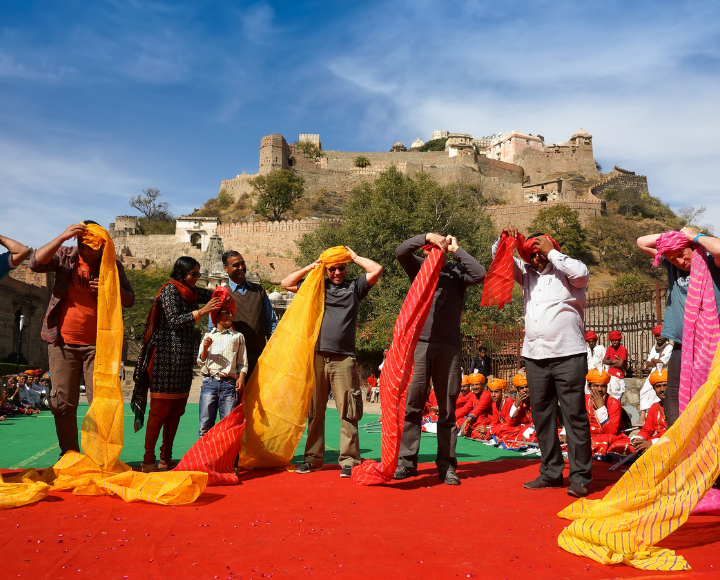Cultural Rajasthan Tour: A Journey through Heritage and Tradition
Rajasthan, the land of kings, is one of India’s most culturally vibrant states. From its rich history, grand forts, and palaces to its timeless traditions and folk arts, a cultural Rajasthan tour offers an immersive experience into India’s regal past. Rajasthan is a place where history comes alive, and every corner narrates stories of valiant rulers, intricate craftsmanship, and age-old traditions. For travelers seeking to explore the depth of India’s culture, Rajasthan stands as a majestic gateway to the past.
The Essence of Rajasthan’s Culture
Rajasthan’s culture is deeply rooted in its history and geography. The state’s arid landscape, with its sprawling deserts and rugged hills, has shaped the lifestyle, traditions, and artistic expressions of its people. Over centuries, the state’s culture has evolved, incorporating influences from various dynasties, including the Rajputs, Mughals, and British colonizers. A cultural Rajasthan tour is not just about sightseeing; it’s about experiencing the lifestyle, festivals, and music that have flourished in this desert land.
Heritage and Architecture
One of the primary attractions of a cultural Rajasthan tour is its unparalleled architecture. The state is dotted with majestic palaces, imposing forts, and intricately designed havelis, all reflecting the grandeur of its royal past. The cities of Jaipur, Udaipur, Jodhpur, and Jaisalmer are particularly renowned for their architectural marvels.

Jaipur, known as the Pink City, is home to the Hawa Mahal, City Palace, and the Grand Amer Fort. Each structure showcases the fine craftsmanship of the era, blending Mughal and Rajput architectural styles. Udaipur, often called the Venice of the East, is famous for its lakes and the exquisite City Palace, which offers stunning views of Lake Pichola. Jodhpur’s Mehrangarh Fort and Jaisalmer’s Golden Fort are other must-visit sites that dominate the landscape, offering insights into Rajasthan’s defense strategies and royal lifestyles.
Traditional Rajasthani Arts
A cultural Rajasthan tour is incomplete without exploring the state’s thriving traditional arts and crafts. Rajasthan has a long-standing tradition of artistic expression, with each region of the state contributing something unique to the cultural tapestry.
The intricate miniature paintings of the Mewar and Marwar regions, the detailed block printing techniques of Bagru and Sanganer, and the vibrant tie-dye (bandhani) textiles are some of the highlights. Additionally, Rajasthan is famous for its blue pottery, originating from Jaipur, and the delicate ivory carvings that showcase the precision and artistry of local craftsmen.
Puppetry and folk performances are also an integral part of the cultural scene. The Kathputli puppet shows, traditional dance forms like Ghoomar and Kalbelia, and musical performances by the Manganiyar and Langa communities bring to life the age-old stories of Rajasthan’s rich heritage.
Festivals Celebrating Culture
Rajasthan is a state of festivals, each showcasing different aspects of its culture and heritage. The festivals provide a unique opportunity for travelers to witness the vibrancy of the local traditions. The Pushkar Camel Fair, held annually in the holy town of Pushkar, is one of the most significant cultural events in the state. It’s a grand spectacle of traditional camel races, folk performances, and religious rituals.
The Jaipur Literature Festival, an international literary event, brings together writers, thinkers, and cultural enthusiasts from around the world. Another important festival is the Desert Festival of Jaisalmer, a colorful celebration in the heart of the Thar Desert that features traditional dances, camel races, and local crafts.
Holi, the festival of colors, and Diwali, the festival of lights, are celebrated with grandeur across the state. These festivals not only represent religious devotion but also reinforce the sense of community and belonging among the people of Rajasthan.
Culinary Traditions
No cultural Rajasthan tour is complete without indulging in its diverse and flavorful cuisine. Rajasthani food is a reflection of its harsh climate and the historical need for long-lasting, non-perishable food items. Dishes like dal baati churma, a combination of lentils, baked wheat balls, and a sweet dish made from crushed wheat, are iconic to the state.
Other traditional Rajasthani dishes include gatte ki sabzi (gram flour dumplings in a spicy curry), ker sangri (a desert vegetable preparation), and laal maas, a fiery meat dish that was once a favorite among the Rajput warriors. For those with a sweet tooth, the state offers delectable desserts like ghewar, malpua, and balushahi, all rich in flavor and tradition.
The street food culture in Rajasthan is also worth exploring, with cities like Jaipur offering mouth-watering snacks such as kachori, mirchi bada, and pyaaz ki kachori which have become synonymous with the local food scene.
Village Life and Rural Traditions
To truly understand the heart of Rajasthan, one must venture beyond the cities and explore the rural villages where age-old traditions are still preserved. A cultural Rajasthan tour often includes visits to these villages, where travelers can witness the simple yet vibrant lifestyle of the people.
Villages like Samode, Khimsar, and Bishnoi are known for their warm hospitality, traditional handicrafts, and folk performances. In these villages, you can see potters, weavers, and metalworkers at their craft, creating items that have been passed down through generations. Camel safaris and jeep tours through the dunes also offer an authentic glimpse into the rural life of the Thar Desert.
Many travelers choose to stay in heritage properties or homestays that allow for a more immersive experience. These accommodations are often restored palaces or havelis, offering a glimpse into royal life while providing modern comforts.
The Spiritual Side of Rajasthan
Rajasthan is also a land of deep spirituality, with numerous temples, shrines, and holy sites scattered across the state. A cultural Rajasthan tour would not be complete without visiting the famous temples that are not only religious sites but also architectural marvels.
The Brahma Temple in Pushkar, dedicated to the creator god Brahma, is one of the most revered temples in India. The Jain Temples of Ranakpur, with their exquisite marble carvings, and the Dilwara Temples on Mount Abu, known for their intricate detailing, are other spiritual highlights.
Additionally, the annual Pushkar Fair is not only a cultural extravaganza but also a time of religious pilgrimage, with thousands of devotees taking a holy dip in the sacred Pushkar Lake.
Conclusion
A cultural Rajasthan tour offers a kaleidoscope of experiences, from exploring majestic forts and palaces to witnessing traditional arts and crafts, savoring delicious Rajasthani cuisine, and immersing in vibrant festivals. Rajasthan’s rich cultural heritage is a testament to its glorious past, and a journey through its cities and villages provides an authentic and unforgettable glimpse into India’s royal legacy.
For travelers seeking to experience India’s cultural heart, Rajasthan stands as a living museum of traditions, festivals, and architectural grandeur. Whether it’s the folk dances under a desert sky or the bustling markets filled with vibrant textiles, Rajasthan promises a journey that leaves a lasting impression on the soul.




